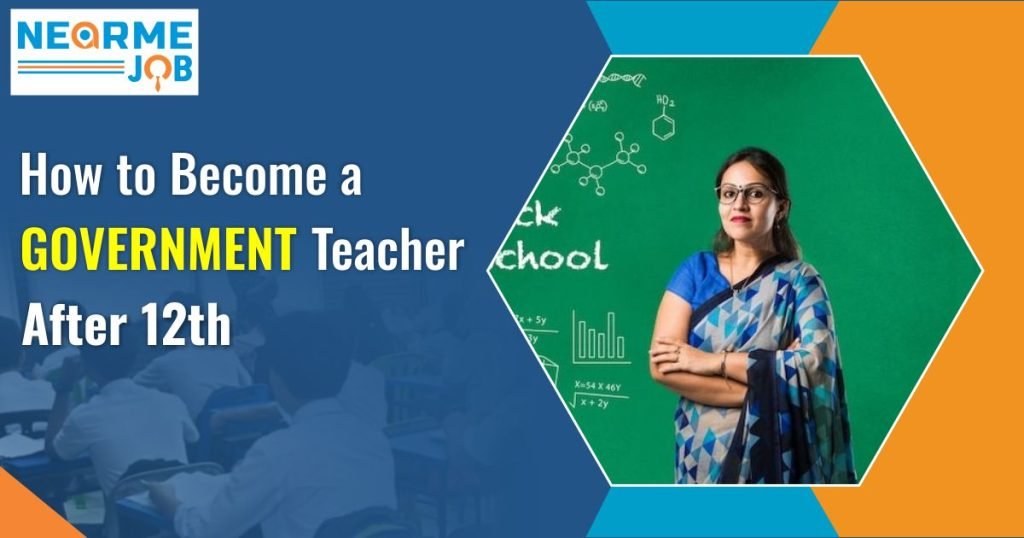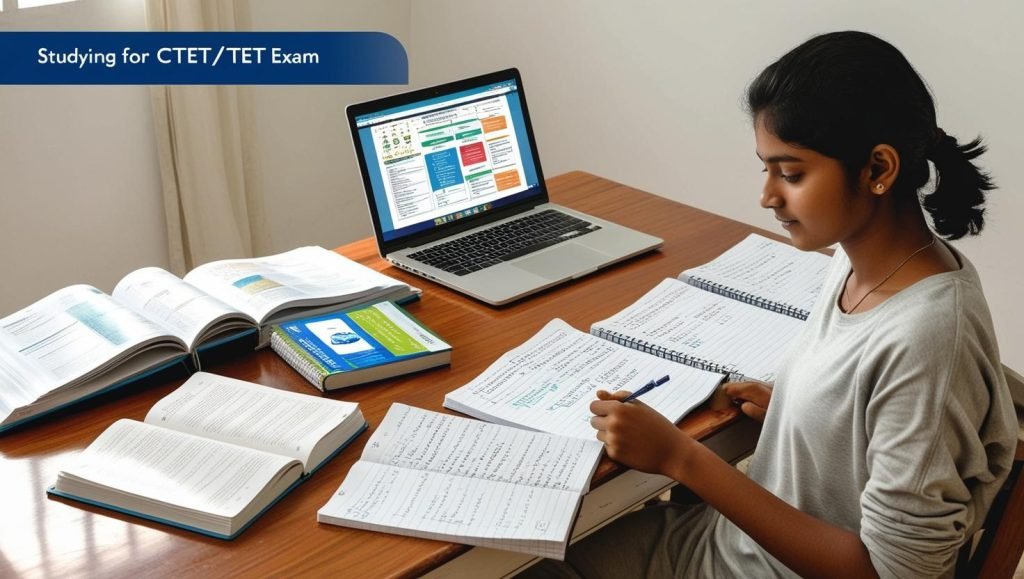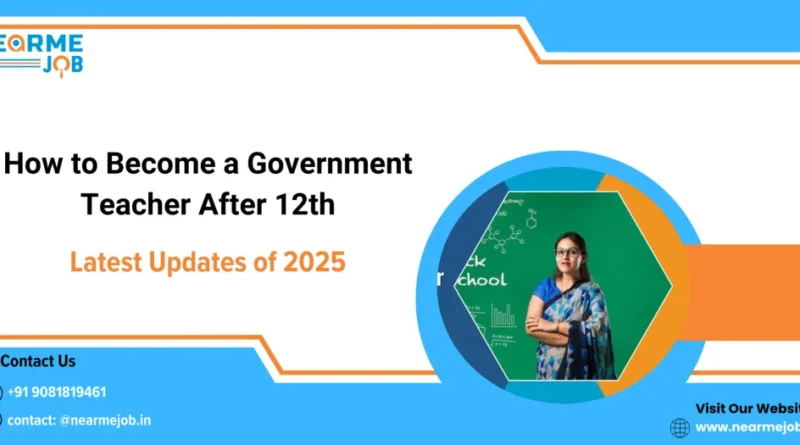How to Become a Government Teacher After 12th in 2025
Teaching is one of the most respected and stable careers in India, especially in government schools. If you’ve just finished your 12th and dream of becoming a government teacher, you’re in the right place.

What are the steps to become a government teacher in India?
Becoming a government teacher in India is a dream career for many, offering job security, attractive salaries, and the chance to shape young minds.
However, the path requires careful planning, from choosing the right qualifications after 12th to clearing mandatory eligibility tests like CTET or state TETs.
Whether you want to teach primary classes or higher secondary levels, the process involves specific education, certifications, and timely applications for government job vacancies.
Here, we break down the exact steps—from diploma courses after 12th to B.Ed degrees, exam preparation, and final selection—so you can select your way to a rewarding teaching career in government schools.
Choose the Right Teaching Course After 12th
To become a government teacher, you need the right qualifications. Here are some popular courses you can pursue right after 12th:
1. Bachelor of Education (B.Ed) – After Graduation
- While you can’t do B.Ed right after 12th, it’s a must for higher-grade teaching jobs.
- First, complete a bachelor’s degree (BA, BSc, BCom), then pursue B.Ed (2 years).
2. Integrated B.A. B.Ed / B.Sc. B.Ed (4 Years)
- Saves time by combining graduation and teacher training.
- Eligible for teaching jobs in primary and upper primary schools.
3. Diploma in Elementary Education (D.El.Ed) – 2 Years
- Focuses on primary-level teaching (Classes 1-5).
- Many government schools hire D.El.Ed graduates.
4. Diploma in Education (D.Ed) – 2 Years
- Similar to D.El.Ed, prepares you for elementary teaching.
5. Nursery Teacher Training (NTT) – 1-2 Years
- For those who want to teach pre-primary classes (Nursery, KG).
Clear Teacher Eligibility Tests (TETs)
Government teaching jobs require qualifying in teacher eligibility tests. The two major exams are:
1. Central Teacher Eligibility Test (CTET)
- Conducted by CBSE for central government schools (KVS, NVS, etc.).
- Valid for lifetime (earlier, it was 7 years).
2. State Teacher Eligibility Test (STET/TET)
- Each state conducts its own TET for state government schools.
- Qualifying makes you eligible for state-run schools.

Exam Pattern:
- Two papers:
- Paper 1 (for Classes 1-5)
- Paper 2 (for Classes 6-8)
- Subjects: Child Development, Language, Maths, EVS, etc.
Apply for Government Teaching Jobs
Once you have the required degree and TET qualification, you can apply for government teaching positions. Here’s how:
1. Primary Teacher (PRT) – Classes 1-5
- Required: D.El.Ed/D.Ed + TET qualified.
- Recruitment through state-level exams.
2. Trained Graduate Teacher (TGT) – Classes 6-10
- Required: Bachelor’s degree + B.Ed + TET/CTET.
- Subjects: Maths, Science, Social Studies, Languages.
3. Post Graduate Teacher (PGT) – Classes 11-12
- Required: Postgraduation (MA/MSc) + B.Ed + CTET/STET.
- Higher secondary schools and Kendriya Vidyalayas hire PGTs.
4. Army Public Schools & Other Govt Institutions
- Keep an eye on job notifications from:
- Kendriya Vidyalaya Sangathan (KVS)
- Navodaya Vidyalaya Samiti (NVS)
- State Public Service Commissions
Why Become a Government Teacher? Benefits
Before diving into the process, let’s look at why government teaching is a great career choice:
Job Security – Permanent positions with no sudden layoffs.
Attractive Salary – Pay scales as per the 7th Pay Commission.
Pension & Retirement Benefits – Unlike private jobs, government teachers get lifelong pensions.
Work-Life Balance – Fixed working hours with holidays and vacations.
Additional Allowances – DA (Dearness Allowance), HRA (House Rent Allowance), and medical benefits.
Respect in Society – Teachers hold a prestigious position in Indian culture.
To gain a comprehensive overview of the various government job categories and their scope in India, refer to our detailed guide on How Many Types of Government Job in India? Explained Here.
Government Teacher Eligibility: Who Can Apply?
To become a government teacher, you must meet these basic criteria:
1. Age Limit
- Primary Teacher (PRT): 18-35 years (varies by state)
- TGT/PGT: Up to 40 years (relaxation for reserved categories)
2. Educational Qualifications
| Level | Required Qualification |
| Primary (Classes 1-5) | 12th pass + D.El.Ed/D.Ed/NTT |
| Upper Primary (6-8) | Graduation + B.Ed/D.El.Ed |
| Secondary (9-10, TGT) | Graduation + B.Ed + CTET/STET |
| Higher Secondary (11-12, PGT) | Postgraduate + B.Ed + CTET/STET |
3. Nationality
- Must be an Indian citizen (some states may have additional rules).
4. Teacher Eligibility Test (TET/CTET)
- Mandatory for all government teaching jobs.
Government Teacher Qualification: Best Courses After 12th
You can’t become a teacher right after 12th, but you can start with these courses:
1. Diploma in Elementary Education (D.El.Ed) – 2 Years
- For teaching Classes 1-5 in government primary schools.
2. Diploma in Education (D.Ed) – 2 Years
- Similar to D.El.Ed, recognized by most states.
3. Bachelor of Elementary Education (B.El.Ed) – 4 Years
- Integrated course for primary & upper primary teaching.
4. Integrated B.A. B.Ed / B.Sc. B.Ed – 4 Years
- Saves time by combining graduation + teacher training.
5. Nursery Teacher Training (NTT) – 1-2 Years
- For pre-primary teaching (Anganwadi, KG, Nursery).
After graduation, you must pursue B.Ed (2 years) for higher classes.
FAQs for How to Become a Government Teacher After 12th
1. Government Teacher Salary: What to Expect?
Government teachers enjoy structured pay scales as per the 7th Pay Commission:
| Level | Pay Scale (Approx.) |
| Primary Teacher (PRT) | ₹25,000 – ₹35,000 |
| Trained Graduate Teacher (TGT) | ₹35,000 – ₹45,000 |
| Post Graduate Teacher (PGT) | ₹45,000 – ₹60,000 |
2. Can I become a government teacher after 12th?
Yes, but not directly. After 12th, you must:
- Complete a 2-year D.El.Ed/D.Ed diploma for primary teaching (Classes 1-5)
- Or pursue a 4-year integrated B.A. B.Ed/B.Sc. B.Ed
- Clear TET/CTET exam
- Then apply for state/central government teacher vacancies
3. How to become a government lecturer after 12th?
For lecturer (PGT/college level), the path is longer:
- After 12th: Complete graduation (3-4 years)
- Then: Postgraduate (2 years) + B.Ed (1-2 years)
- Clear:
- CTET/STET for schools
- NET/SET for college lectureship
- Apply through:
- KVS/NVS for PGT posts
- State PSC/UPSC for higher education
4. Can I do B.Ed after 12th?
No, B.Ed requires:
- Minimum qualification: Graduation (any stream)
- New NCTE rule: Must complete 4-year integrated B.A. B.Ed/B.Sc. B.Ed after 12th
- Traditional B.Ed (2 years) is only after bachelor’s degree
5. Which course is best for government teacher?
| Career Stage | Best Course |
| Primary (1-5) | D.El.Ed (2 years after 12th) |
| Upper Primary (6-8) | B.A. B.Ed/B.Sc. B.Ed (4-year integrated) |
| Secondary (9-10) | Graduation + B.Ed (3+2 years) |
| PGT (11-12) | Postgraduation + B.Ed (5+2 years) |
| Fastest Route | 4-year integrated B.Ed programs |
[html_block id=”238″]

